Dr Marina Pérez de Arcos wins prestigious James Whiston Memorial Prize
Dr Marina Pérez de Arcos, of Oxford University and the London School of Economics, has been awarded the James Whiston Memorial Prize for the most outstanding academic article of 2021 by the Editors of the Bulletin of Spanish Studies.
Her two-part study ‘Education, Intelligence and Cultural Diplomacy at the British Council in Madrid, 1940–1941’, focuses on the founding of the British Council’s first branch in Spain and only school to date with Irish Hispanist Walter Starkie at its head.
Professor Isabel Torres, general editor of the Bulletin of Spanish Studies, said: ”Dr Pérez de Arcos’ meticulous archival research and engaging voice sheds light on an important period in history. It is a superbly researched and well-argued study that merits the highest praise”.
The James Whiston Memorial Prize of £1,000 is awarded each year to the author of an article on any subject within the field of Spanish, Portuguese and Latin American Studies, which is judged by a panel of peer assessors to be the most original, accomplished and important study recently published (or accepted for publication) in the Bulletin of Spanish Studies or the Bulletin of Spanish Visual Studies.
Dr Pérez de Arcos said: “I am delighted that my research has been recognised in this way by my peers. My main ambition is to share my knowledge with as wide an audience as possible—winning this accolade will help draw attention to the remarkable events that took place in Spain in the early 1940s”.
Dr Pérez de Arcos is Research Associate at the Centre for International Studies and the Department of Politics and International Relations at the University of Oxford, where she teaches International Relations, and founding coordinator of Spanish Studies at Oxford until the end of this academic year. She is also guest Research Fellow at LSE, where she teaches International History. Her research covers Spain’s internationalisation in the 1970s and 1980s, Spain’s humanitarian policy during WWI, early Hispanism at Oxford, and she is co-founder of Global Thinkers of the International—a project aiming at revitalising silenced and underrepresented voices in international relations. She also has a keen interest in policy making and was a presidential advisor to Spain on G20 matters.
The annual prize of £1,000, donated from 2019 by Taylor & Francis Group, Publishers of the Bulletin of Spanish Studies and its sibling journal the Bulletin of Spanish Visual Studies, has been established to honour the memory of James Whiston (1945–2017), Associate Professor, Fellow and Fellow Emeritus, Trinity College, Dublin and Member of the Royal Irish Academy. An internationally respected scholar of modern Spain, its history and culture, Professor Whiston was for many years (2002–2014) General Editor of the Bulletin of Spanish Studies.
The James Whiston Memorial Prize was awarded in 2019 to Dr Matthew Marr of The Pennsylvania State University, for his article (Im)mobility at the Movies: el paro, Property and Prosthesis in Álex de la Iglesia’s La chispa de la vida (2011)* and in 2020 to Dr David Rojinsky, University of Leeds for his study Reconciling Myth with Photographic Histories in Leandro Katz’s El día que me quieras.
The Bulletin of Spanish Studies was founded at the University of Liverpool in 1923 by the influential British Hispanist E. Allison Peers, and is a learned review dedicated to research into the languages, literatures, histories, cultures and civilizations of Spain, Portugal and Latin America. Also known as the Bulletin of Hispanic Studies (1949–2001), the Bulletin of Spanish Studies soon established a worldwide reputation and is now recognised as one of the front-ranking journals in the field of Hispanic scholarship, publishing 10 issues per year. Its sibling journal the Bulletin of Spanish Visual Studies was established in 2017 and is published biannually.
Dr Marina Pérez del Arcos’ prize-winning article is available here:
Education, Intelligence and Cultural Diplomacy at the British Council in Madrid, 1940–1941
Part 1: Founding a School in Troubled Times
Part 2: Shock Troops in the War of Ideas
This research was partly funded by a Santander Universities and British Spanish Society scholarship. Many of the archival materials used came from the National Archives and the Real Academia Española of which Walter Starkie was a corresponding Fellow.
Further information on the award can be found at https://think.taylorandfrancis.com/journal-prize-james-whiston-memorial-prize/
Conference: Translating Small Literatures in the British Book Market
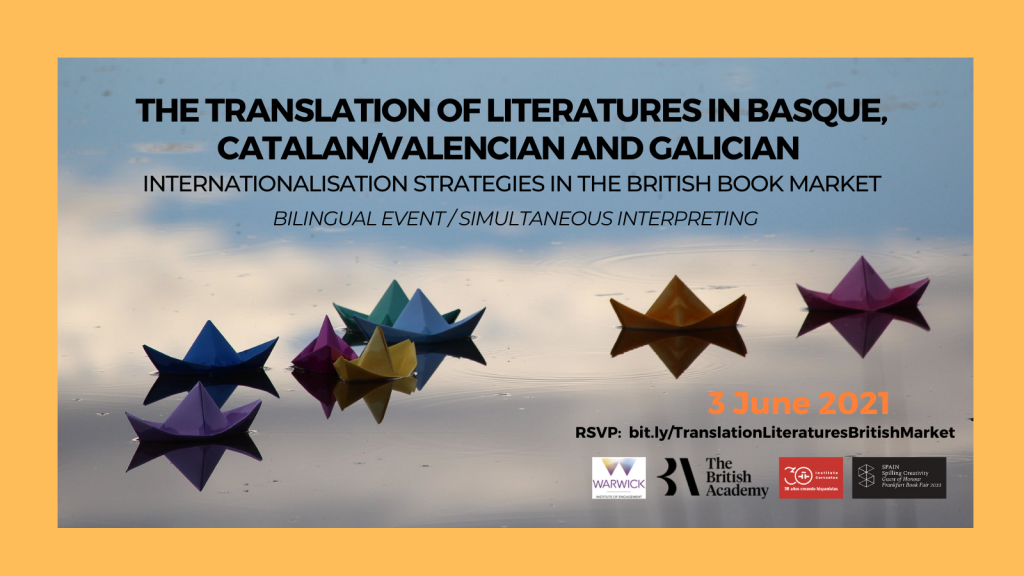
The translation of literatures in Basque, Catalan/Valencian and Galician
Internationalisation Strategies in the British Book Market
3-4 June 2021
This event will discuss current challenges and opportunities faced by literatures written in the Basque, Catalan/Valencian and Galician languages in their translation into English. Scholars, delegates from source-culture institutions and representatives from the British publishing houses that are currently leading the translation market will explore the following questions: What makes British publishers translate literature written in lesser translated languages? Do translation grants matter? What is the circulation and dissemination of translated literary works from these languages? How are they received in the anglosphere? Will the 2022 edition of the Frankfurt Book Fair, in which Spain will be guest of honour, be a turning point in the internationalisation of these literatures?
These sessions will be of interest to:
- Readers of translated literature
- Literary translators working in the Anglophone market
- Translation-policy makers
- Writers looking to internationalise their literary production
- Literary agents
- British publishers and source-culture publishers with translation rights to sell
- To anyone who loves books, cultural exchanges and translation
This is an initiative organised by Olga Castro (University of Warwick) and Laura Linares (University College Cork), in collaboration with the Instituto Cervantes in London. It is linked to the research project “Cultures in Translation: The Case of 21st Century Basque, Catalan and Galician Literatures in English Translation,” led by Olga Castroand funded by the British Academy/Leverhulme Small Grants Scheme (2018-2021) and has also received financial support from the Warwick Institute of Engagement, University of Warwick
Thursday, 3 June. 3-7pm BST (GMT +1)
The event will be carried out in Zoom.
Simultaneous interpreting Spanish/English will be available for all sessions
3pm. Welcome
- Opening remarks by Luis García Montero, Director of Instituto Cervantes
- María José Gálvez, Ministry of Culture and Sports of Spain
- Olga Castro, University of Warwick
- Laura Linares, University College Cork
3.10pm. Plenary session
Olivia Hellewell, University of Nottingham: «Supply-driven Translation and Less Translated Languages”
3.50pm. Break
4pm. Roundtable: “Translation Challenges and Opportunities in the Literary Book Market: Perspectives from British Publishing Houses and Source-culture Institutions.”
- Ra Page, Comma Press
- Joely Day, Fitzcarraldo Editions
- Stella Sabin, Pereine Press
- Izaskun Arretxe, Ramon Llull Institute
- Vicent Moreno Montañés, Valencian Government
- Jose Luis Maestro, Galician government
- Irene Larraza Aizpurua, Basque Etxepare
- Begoña Cerro Prada, Ministry of Culture and Sports of Spain
5.45pm. Break
6pm. Open discussion between roundtable participants and the audience: “What Shape Can the Internationalisation of these Literatures Take in a More Welcoming British Literary Market?”
7pm. Closing remarks
- Ignacio Peyró, Instituto Cervantes London

La traducción de las literaturas en catalán/valenciano, gallego y vasco
Estrategias de internacionalización en el mercado editorial británico
3-4 de junio 2021
Esta jornada reflexionará sobre las oportunidades y los desafíos a los que se enfrentan las literaturas en lengua catalana/valenciana, gallega y vasca en la actualidad de cara a su traducción a inglés. A través de las intervenciones de personal académico, responsables de instituciones culturales del contexto de partida con competencias en políticas de traducción y representantes de editoriales británicas que lideran el campo de la traducción al inglés, se debatirán las siguientes cuestiones: ¿Qué condiciones deben darse para que una editorial británica decida traducir literatura escrita en las llamadas lenguas menos traducidas? ¿Influyen las ayudas a la traducción? ¿Qué circulación tienen las obras traducidas desde estos idiomas? ¿Cuál es su recepción en el contexto anglófono? ¿Supondrá la Feria de Fráncfort de 2022, con España como cultura invitada, un punto de inflexión en la internacionalización de estas literaturas?
Es un evento especialmente dirigido a:
- Amantes de la literatura y la traducción
- Profesionales de la traducción literaria que trabajen en el mercado anglófono
- Personal de la administración con competencias en traducción
- Profesionales de la escritura que deseen internacionalizar su obra
- Agencias literarias
- Editoriales británicas interesadas en la traducción
- Editoriales de los contextos de partida interesadas en la venta de derechos de traducción
- A cualquier persona amante de los libros, los intercambios culturales y la traducción
Se trata de un acto organizado por Olga Castro (University of Warwick) y Laura Linares (University College Cork), con el apoyo del Instituto Cervantes de Londres. Está vinculado al proyecto de investigación “Cultures in Translation: The Case of 21st Century Basque, Catalan and Galician Literatures in English Translation”, dirigido por Olga Castro y financiado por la convocatoria British Academy/Leverhulme Small Grants Scheme (2018-2021). También ha recibido apoyo financiero del Warwick Institute of Engagement, University of Warwick.
Jueves, 3 de junio. 15-19h (hora británica)
Evento en Zoom con interpretación simultánea castellano-inglés en todas las sesiones
15h. Bienvenida
- Saludo inicial de Luis García Montero, director del Instituto Cervantes
- María José Gálvez, Ministerio de Cultura y Deporte
- Olga Castro, University of Warwick
- Laura Linares, University College Cork
15.10h. Conferencia inaugural
Olivia Hellewell, University of Nottingham: «La traducción suministrada desde el contexto de partida y lenguas menos traducidas»
15.50h. Pausa
16h. Mesa redonda: «Oportunidades y desafíos en el mercado editorial de la traducción: perspectivas de las editoriales británicas y de las instituciones culturales del contexto de partida»
- Ra Page, Comma Press
- Joely Day, Fitzcarraldo Editions
- Stella Sabin, Pereine Press
- Izaskun Arretxe, Instituto Ramon Llull
- Vicent Moreno Montañés, Generalitat de València
- Jose Luis Maestro, Xunta de Galicia
- Irene Larraza Aizpurua, Basque Etxepare
- Begoña Cerro Prada, Ministerio de Cultura y Deporte
16.45h. Pausa
19h. Debate entre participantes en la mesa redonda y el público: «¿Cómo queremos y podemos internacionalizar en un mercado editorial británico en apertura?»
19h. Cierre
- Ignacio Peyró, Instituto Cervantes Londres
El Galician Film Forum estrena ‘Nación’, la última película de Margarita Ledo, en el Reino Unido
● La organización londinense prosigue con su actividad a pesar de la pandemia con la proyección online del último film de Margarita Ledo
● El miércoles 19 está previsto un encuentro en directo por vía telemática con la directora
● La película estará disponible entre los días 15 y 23 de mayo en la plataforma Vimeo On Demand en exclusiva para el Reino Unido
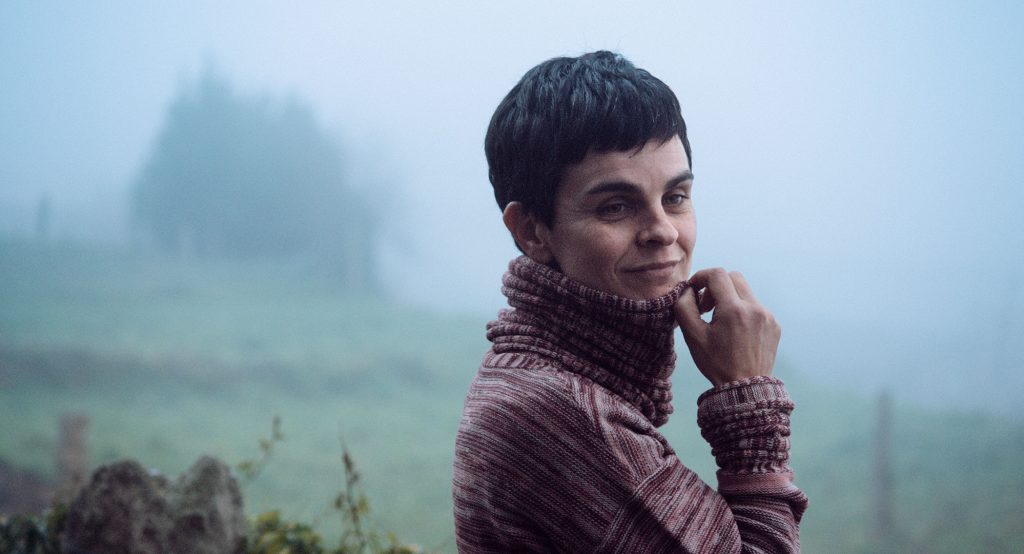
El Galician Film Forum (GFF) de Londres celebra este año el Día de las Letras Galegas con el estreno en el Reino Unido de ‘Nación’, el último film de Margarita Ledo. Así, entre los días 15 y 23 de mayo, la película estará disponible en la plataforma Vimeo On Demand en exclusiva para el Reino Unido. Además, también está previsto un encuentro en línea con la directora el miércoles 19 de mayo, a las 7 de la tarde (horario británico), que se retransmitirá en directo a través de las redes sociales del GFF. Esta actividad es posible gracias al patrocinio de la Oficina para Asuntos Culturales y Científicos de la Embajada de España en Londres.
El film se va a exhibir en versión original con subtítulos en inglés y el alquiler por 48 horas tendrá un coste de 3,95 libras; además, el número de entradas estará limitado. Esta proyección en el Reino Unido tiene lugar siete semanas después de su estreno en las salas comerciales en España, donde aún puede encontrarse en cartelera. ‘Nación’ se estrenó en el 17 Festival de Sevilla, donde se alzó con el premio a la Mejor Dirección de Película Española, y recibió el Maestro Mateo 2021 al Mejor Documental.
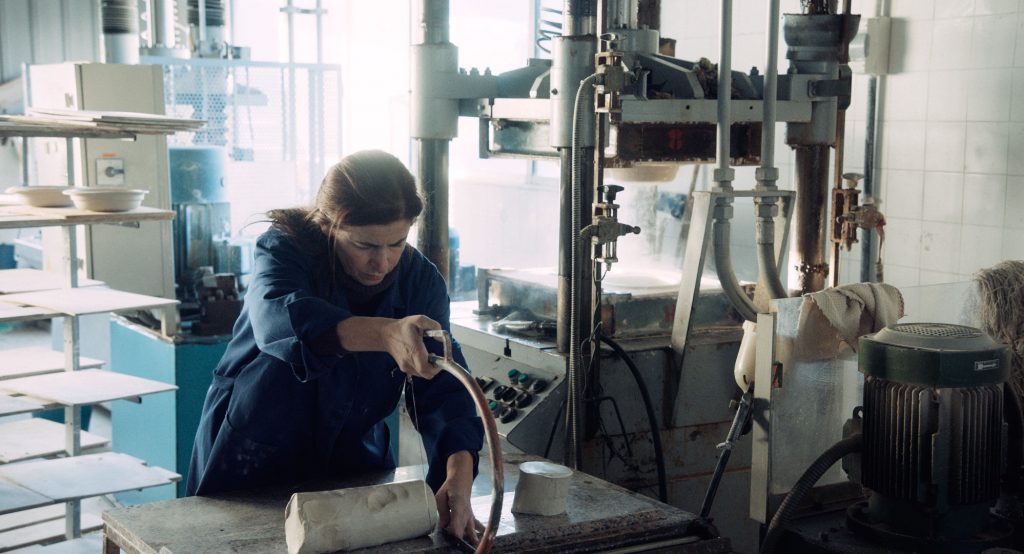
Una lucha inacabada
En este filme de no ficción, Margarita Ledo aborda lo mucho que tardaron las mujeres en tener derechos, “no solamente en votar, sino en lograr un trabajo asalariado y en la posibilidad de ser independientes. En resumen, en lo mucho que nos llevó ser Nación”. El eje argumental es el cierre de la fábrica de cerámica Pontesa en 2001 y como, veinte años después, mientras esperan la sentencia sobre la reclamación de la deuda pendiente, un grupo de trabajadoras recuerda el símbolo de su libertad individual, su emancipación económica y su lucha sindical.
Esas trabajadoras mantienen viva la reivindicación de los derechos de la mujer en la España del siglo XX. La historia de sus vidas se desarrolla en presencia de una esfinge, encarnada por Eva Veiga, que reclama la memoria de las operarias del textil, la cerámica y la conserva y anuncia voces y archivos que engarzan tiempos y cuerpos diferentes.
En ‘Nación’ se alternan las imágenes de archivo y las interpretaciones de Mónica Camaño, Mónica de Nut, Laura Martínez Iglesias y Xoana Pintos con la participación de las extrabajadoras de Pontesa: Nieves Pérez Lusquiños, Manuela Nóvoa Pérez, Ester García Lorenzo, Carmen Portela Lusquiños y Carmen Álvarez Seoane.
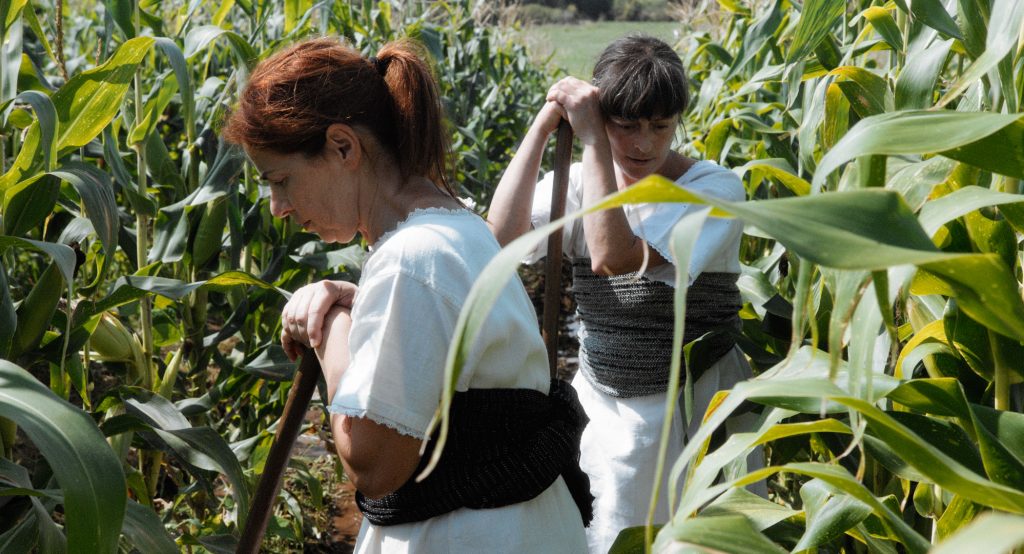
Margarita Ledo Andión (1951, Castro de Rei, Lugo) es una relevante figura de la cultura conocida por sus facetas de cineasta y escritora. Además, es catedrática de Comunicación Audiovisual en la Universidad de Santiago de Compostela, donde también ejerció como decana. Publicó su primer libro, el poemario ‘Parolar cun eu,cun intre,cun inseuto’, en 1970, y con el tiempo verían la luz otros títulos de poesía, narrativa, ensayo e investigación.
A lo largo de su trayectoria vital fundó y dirigió diversas publicaciones con especial foco en la reivindicación de la lengua gallega y de espíritu militante. Su filmografía consta de los largometrajes ‘Santa Liberdade’ (2004), ‘Liste, pronunciado Líster’ (2007) y la ficción ‘A cicatriz blanca’ (2012), basada en su novela ‘Porta blindada’. También ha dirigido varias piezas cortas experimentales y documentales. En el 2017 el festival internacional Documenta Madrid le dedicó una retrospectiva. Fue Premio Nacional de la Cultura Gallega 2008 en Cine y Audiovisual y Premio Otero Pedrayo 2017 y es numeraria de la Real Academia Gallega.
Entradas ‘Nación’:https://vimeo.com/ondemand/nacion/
La última entrevista a Trevor Dadson: «¿Qué sabes tú de España si no has leído el ‘Quijote’?»
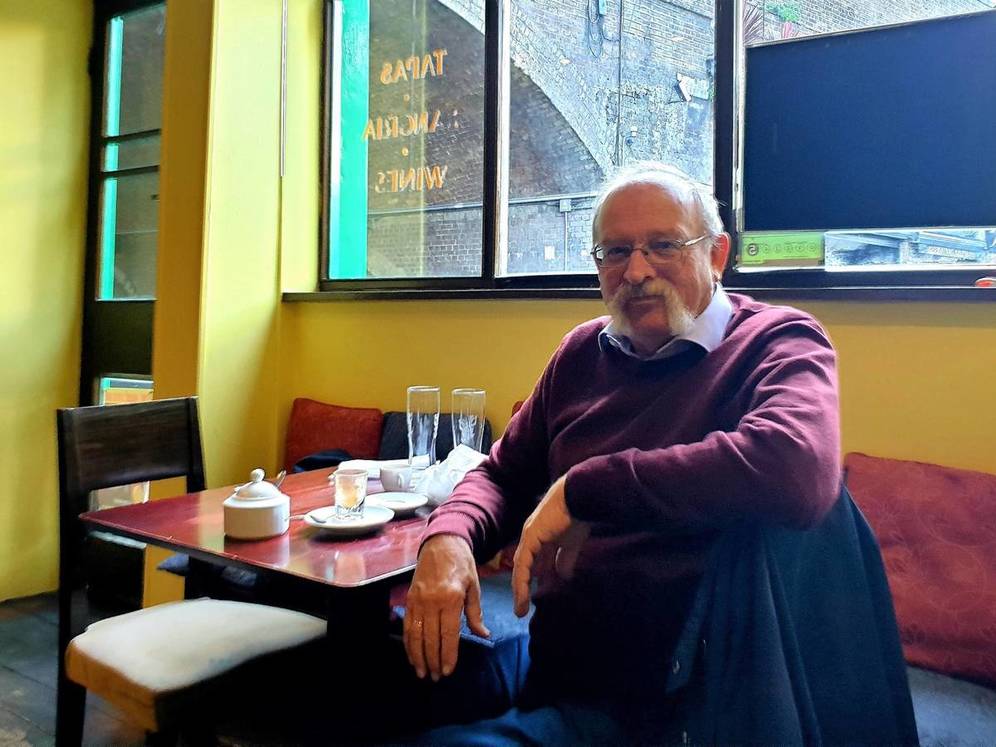
Por Ignacio Peyró, director del Instituto Cervantes de Londres.
Fallecido hace un año por estas mismas fechas, el catedrático británico Trevor Dadson (1947-2020) fue un hispanista de leyenda, un académico de currículo interminable, un mentor y maestro de generaciones de estudiosos y -ante todo- un enamorado de España y la cultura española. Si sus contribuciones a nuestra Historia y nuestra Historia de la literatura abarcan de los moriscos hasta Góngora o la poesía más reciente, el legado de Dadson no es únicamente erudito: entre los suyos -y no está de más recordar que fue presidente de los hispanistas británicos e irlandeses- iba a gozar de tanta autoridad como afecto. Y solo la pandemia ha retrasado homenajes y memoriales.
Lee la entrevista completa en la web de El Confidencial.
¡Inscríbete ya! ¡Nuevas convocatorias de diplomas de español DELE 2021 disponibles!

Los Diplomas de español DELE son títulos oficiales, acreditativos del grado de competencia y dominio del idioma español, que otorga el Instituto Cervantes en nombre del Ministerio de Educación y Formación Profesional y Ministerio de Exteriores, Unión Europea y Cooperación de España.
Los exámenes DELE están diseñados siguiendo las directrices del Marco común europeo de referencia (MCER) del Consejo de Europa.
Nuevas convocatorias de los Diplomas de español DELE 2021 en el Instituto Cervantes de Londres en mayo, julio, septiembre y noviembre
- 21 mayo (examen oral y escrito). DELE Escolar: Niveles A1 y A2/B1
Plazo de inscripción: hasta el 10 de marzo - 22 mayo (examen escrito), 21/22 de mayo (examen oral). Niveles: A1, A2, B1, B2, C1, C2*
Plazo de inscripción: hasta el 10 de marzo - 9 de julio (examen escrito), 9/10 de julio (examen oral). Niveles: A2, B1, B2, C1*
Plazo de inscripción: hasta el 5 de mayo - 10 de septiembre (examen oral y escrito). Nivel A2
Plazo de inscripción: hasta el 7 de julio - 12 de noviembre (examen oral y escrito). DELE Escolar: Niveles A1 y A2/B1
Plazo de inscripción: hasta el 29 de septiembre - 13 de noviembre (examen escrito)
- 12/13 noviembre (examen oral). Niveles: A1, A2, B1, B2, C1, C2*
Plazo de inscripción: hasta el 29 de septiembre
*Por favor, tenga en cuenta que es posible que el examen oral no sea el mismo día que el escrito
Para más información, visite nuestra web.
World Illustration Awards 2020 Winners Announced!
The AOI, in partnership with the Directory of Illustration, is delighted to announce the Winners of the World Illustration Awards 2020.
The AOI has been holding an annual illustration competition for over 45 years and this year’s call for entries encouraged illustrators to Be Ambition, Be Seen and Be Celebrated.
An incredible 4,300+ entries were submitted in answer to that call by illustrators from 79 countries into this year’s awards. This was followed by a competitive judging process to select the winning projects from a shortlist of 200.
Here are the New Talent and Professional Award winners chosen by the international industry jury for each of the ten award categories including Advertising, Editorial, Children’s Publishing, and Design, Product & Packaging. x
Category Winners
New Talent Book Covers Category Winner
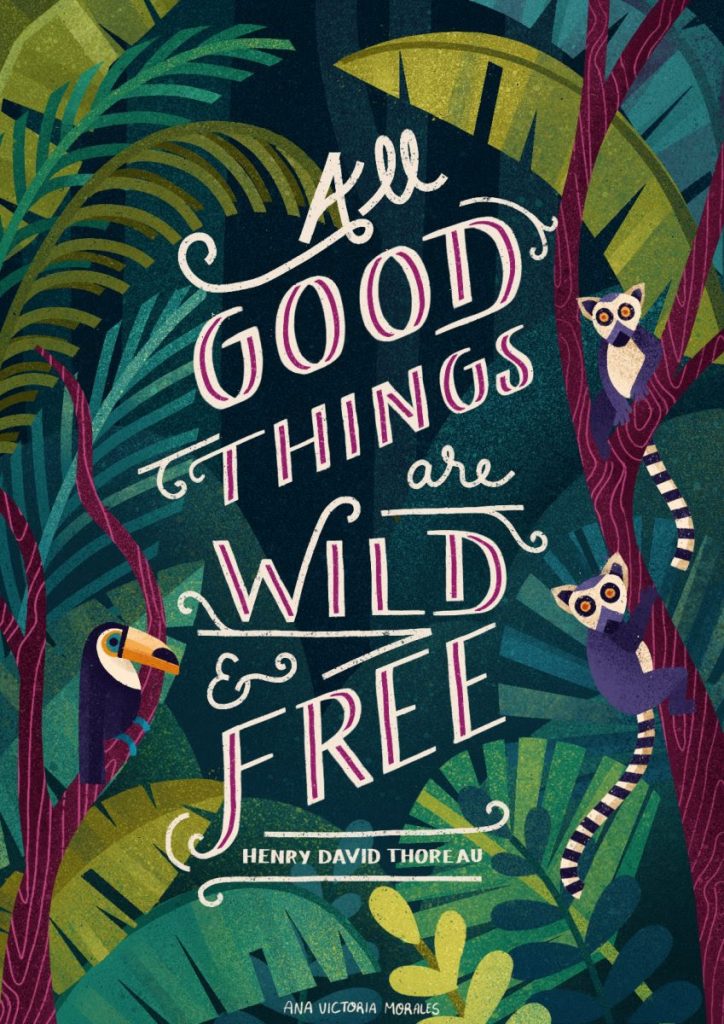
All Good Things are Wild and Free
By Ana Victoria Morales
Venezuelan illustrator based in Luxembourg. She has been living in Luxembourg for half of my life so it has become her home. She has always been a very artsy kid and would always beg her mom for more crayons or paints growing up while they were out shopping. She originally studied graphic design because she thought it was a creative enough career that would allow herto work in many different places but she quickly realised she needed to breath, eat and sleep creativity in order to be happy in life so she switched to illustration 2 years ago.
My business has been slowly growing and right now I mostly work in the wedding industry, but I am hoping to break in to the children’s book market soon after I graduate from my MA in illustration at Hertfordshire University
Ana Victoria Morales
New Talent Children’s Publishing Category Winner
By Mariajo Ilustrajo

She was born in Madrid where she studied Illustration at the school of art, Arte 10. She has been a freelance illustrator since then, completing projects for a wide range of clients with some personal projects along the way. A few years after she finished my studies as an illustrator, She moved to Bath where she studied Graphic Communication at Bath Spa University. She believes learning never stops, so she is currently studying a Masters in Children´s Books Illustration, at Anglia Ruskin University, pursuing her dream of become a children’s books illustrator/ author. She loves experimenting with a lot of materials and getting my hands dirty but also using her computer. By exploring new ways of working, learning from a diverse range of people and discovering new places herimagination is fuelled.
Every project is different and teaches me new things. I will never lose the excitement of a new commission.I LOVE what I do, so I am always ready for a new challenge!
Mariajo Ilustrajo
Professional Science & Technology Category Winner
By Daniel Liévano
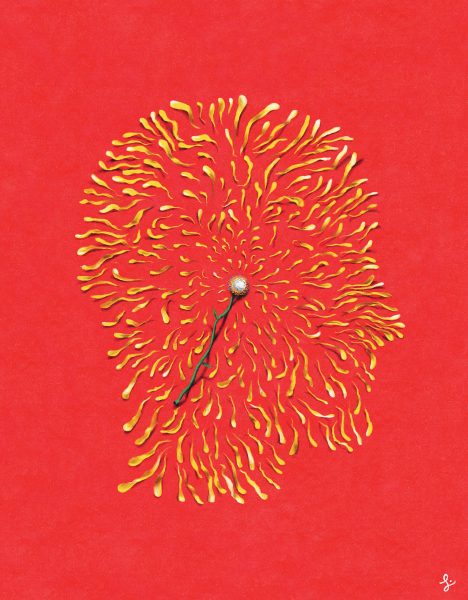
He is a Colombian award-winning illustrator that has dedicated most of his time creating covers and images for books, magazines and newspapers such as The Sunday Times, The Washington Post, The Boston Globe and The Lancet. Some awards include Communication Art Awards of Excellence, Gold Medal Society of Illustrators NY, 3×3 Honorable mentions and bronze medal Latin American Design Awards. He currently lives and works in his hometown.
«Descubre tu ciudad ideal para aprender español»

El Instituto Cervantes, en colaboración con Miríada X, la principal plataforma iberoamericana de MOOC’s (cursos en línea masivos en abierto) lanzala sexta edición del NOOC (nano cursos en línea masivos y abiertos) «Descubre tu ciudad ideal para aprender español».
¿Cómo es tu ciudad ideal? ¿Qué ciudades españolas conoces? ¿Tienes alguna favorita? En este curso de español de nivel A2-B1, vas a conocer cuatro ciudades españolas y vas a aprender a describir lugares, a hablar de sus principales características y a expresar tus gustos y preferencias sobre actividades de ocio y tiempo libre que puedes realizar en la ciudad.
Spanish, a language spoken by 585 million people, and 489 million of them native
A total of 585 million people speak Spanish in the world, 7.5% of the world’s population. Of these, 489 million – six million more than a year ago – are native Spanish speakers. These data confirm the positive evolution of Spanish in the last decade, in which potential users have grown more than 30% and study it 60% more than in 2010.
Exploring AutoCAD Civil 3D 2018 – https://abcoemstore.com/product/autodesk-autocad-civil-3d-2018/ book introduces the users to the powerful Building Information Modeling (BIM) solution.Furthermore, Spanish is the second mother tongue by number of speakers after Mandarin Chinese, and the third language in a global count of users after English and Mandarin Chinese. On the Internet, Spanish is the third most used: 7.9% of users communicate in Spanish. It is the second language, behind English, in the publication of scientific texts. More than 907,000 foreigners come each year to study it, and they choose Spain for three main reasons: the cultural offer, the weather and the attractiveness of the country.
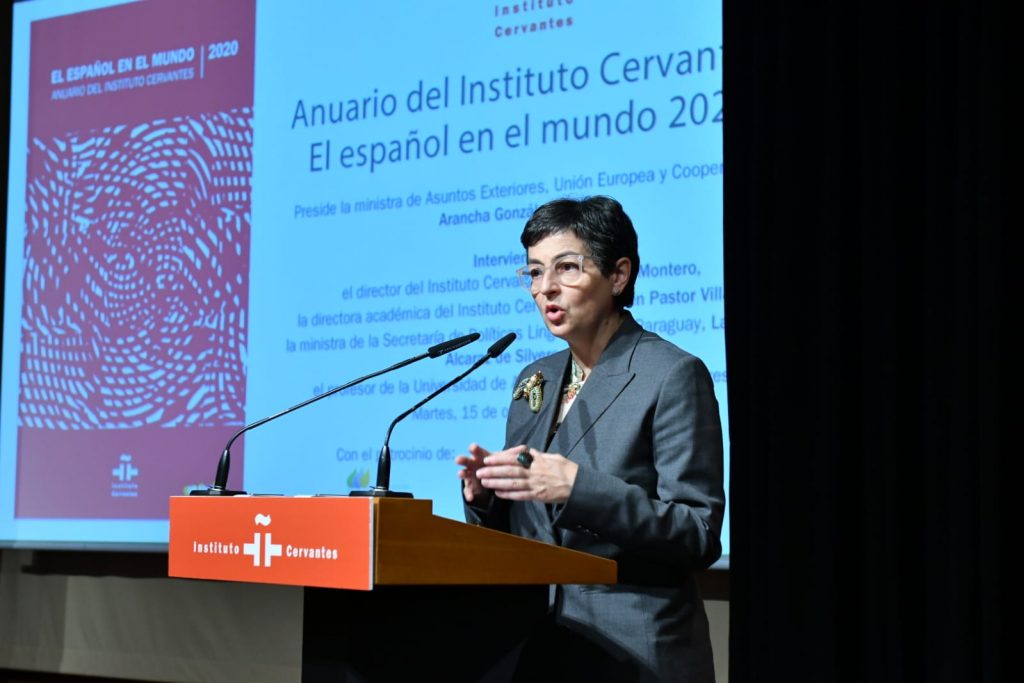
These are some of the most outstanding data of the «Yearbook 2020 Spanish in the World 2020» presented today by the Minister of Foreign Affairs, Arancha González Laya, and the director of Instituto Cervantes, Luis García Montero. The academic director of Cervantes, Carmen Pastor; the Minister of Language Policies of Paraguay, Ladislaa Alcaraz, and professor David Fernández Vítores, author of the 2020 report Spanish, a living language.
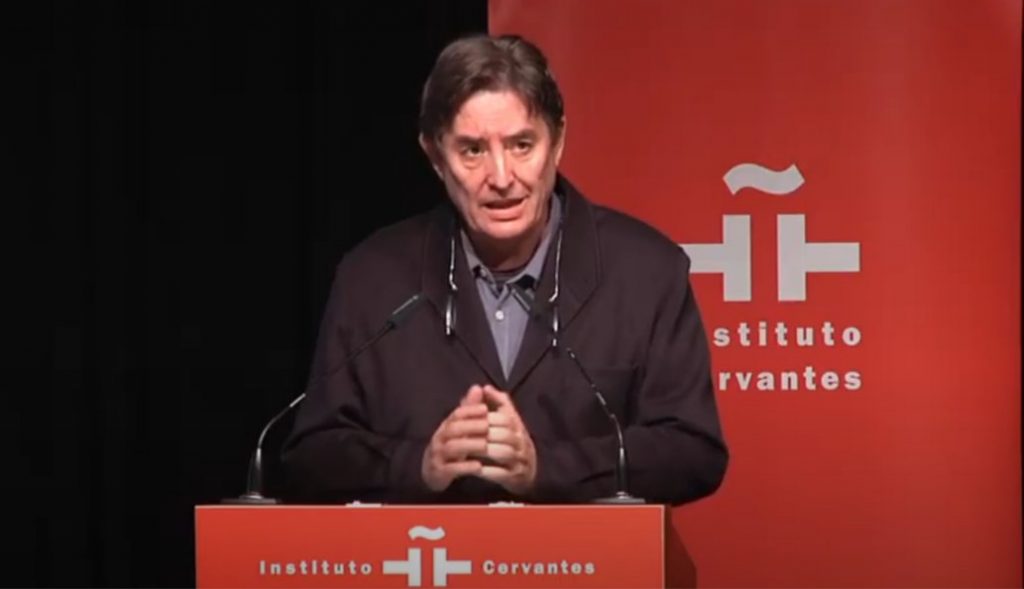
The most significant figures for 2020 are the following:
• Almost 489 million people speak Spanish as their mother tongue, six million more than last year.
• The group of potential users of Spanish (native Spanish speakers plus users of limited competence and foreign language learners) exceeds 585 million, five million more than in 2019. They represent 7.5% of the world population.
• Spanish is the second mother tongue in the world by number of speakers, after Mandarin Chinese.
• It is the third language in a global tally of speakers (native proficiency + limited proficiency + Spanish students), after English and Mandarin Chinese.
• In the last decade (since this annual report was written) the positive evolution of Spanish has been confirmed:
◦ The number of potential speakers has grown more than 30%.
◦ The group of students as a foreign language has expanded by almost 60%.
◦ The role of Spanish is reinforced to the detriment of more established languages such as French and German.
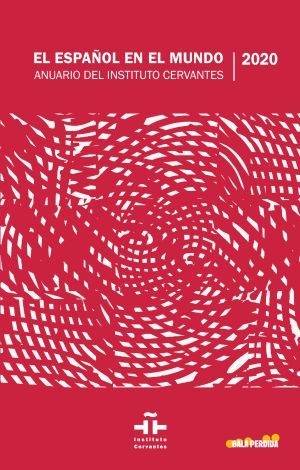
• The number of Spanish speakers will continue to grow in the coming decades. In the second half of the century, its relative weight will begin to decrease progressively.
• In the year 2100, 6.3% of the world’s population will be able to communicate in Spanish.
• More than 22 million students study Spanish as a foreign language in 2020. Specifically, a total of 22,329,275.
12 de Octubre | Celebración de la Fiesta Nacional de España

Con motivo de la celebración de la Fiesta Nacional el próximo lunes 12 de octubre, la Embajada de España en Londres les invita a seguir las actividades virtuales a lo largo del día.
Programa Oficial Puede seguir las actividades haciendo click aquí
12:00
Palabras del Embajador de España para el Reino Unido, Excmo. Sr. D. Carlos Bastarreche Sagües Himno Nacional y Brindis
12:15
Vídeo oficial del Ministerio de Asuntos Exteriores, Unión Europea y Cooperación
12:30
“Rediscovering the Alhambra”, por Natalia Muñoz-Rojas, Asistente de Conservación en la Wallace Collection
“Increasing SARS-CoV-2 diagnostics capacity”, por Rocío Martínez Núñez, Investigadora en King’s College
13:05
“Spanish Researchers in Britain”, con la participación de los investigadores J.A. Carrillo de la Plata, D. Pulido Gómez, A. Jaramillo, R. Martínez Núñez y de Joan Pons Planas, sanitario NHS
“Philip V’s Rococo Interiors at la Granja de San Idelfonso”, por Félix Zorzo, Asistente de Conservación de la Wallace Collection * * *
Celebración desde el Teatro Cervantes de Londres de un programa en directo de música clásica española e iberoamericana, presentado por el Director del Instituto Cervantes en Londres, D. Ignacio Peyró.
Conéctese haciendo click aquí
19:00
“La guitarra española: música de España y Latinoamérica”, música de Gaspar Sanz, Dionisio Aguado, Fernando Sor, Manuel Ponce, Alberto Ginastera y Astor Piazzolla interpretada por Johan Löfving.
New Cultural Calendar October 2020

THEATRE
Autum Season at the Cervantes Theatre: 10 Online Dramatised Readings Series
The Cervantes Theatre, with the support of Acción Cultural Española and in collaboration with the Instituto Cervantes and the Embassy of Spain in the United Kingdom, brings this event as part of the New Spanish Playwriting Season IV.
Session 3: Taxi Girl by María Velasco, translated by Jessica Rainey. Taxi Girl is an expression which refers to the paid dance partners that became popular at the beginning of the 20th century. The play is set in a historical love triangle, starring a taxi girl and two heavyweights of universal literature, Henry Miller and Anaïs Nin. What was the name of the taxi girl? What did the voice of that female of dubious reputation that rebelled against her fetish and parade condition? This play was awarded with the Premio Max Aub – Ciutat de València in 2017.
Thu 1, 7:00 pm – Followed by a Q&A with the author, translator and artistic staff. In English www.cervantestheatre.com

CINEMA
Spanish online LGTBI+. Shortfilms series
The Instituto Cervantes offers eight fiction and documentary short films that cover the different expressions and representations of the LGTBI+ collective with an evident commitment. This is to give an image of creativity around these identities. It presents excellent cinematographic works from Colombia, Mexico and Spain.
Programme:
Porque no, by Ruth Caudeli, 2016. Eva menos Candela, by Ruth Caudeli, 2018.
Juan de las brujas, by Andrew Houchens, 2019.
Princesa de hielo, by Pablo Guerrero, 2017.
Piscina, by Carlos Ruano, 2017.
El niño que quería volar, by Jorge Muriel Mencia, 2018.
Visibles, by Enrique Rey Momanzón, 2018.
En la azotea, by Damià Serra Cauchetiez, 2016.
Available 48 hours from 7:00pm. Fri 2 – Sun 4, Tue 6 – Thu 8, Fri 9 – Sun 11, Tue 13 – Thu 15, Fri 16 – Sun 18, Tue 20 – Thu 22, Fri 23 – Sun 25, Tue 27 – Thu 29, each shortfilm – In Spanish with English subtitles
www.vimeo.com/showcase/lgtbi-es%20

CINEMA
16th London Spanish Film Festival: Screening of Ferdinand
The Oscar-nominated animation movie for children, by Carlos saldanha, takes us on an adventure with a young bull, who escapes from a training camp in rural Spain. Adopted by a girl who lives on a farm, Ferdinand’s peaceful existence comes crashing down when the authorities return him to his former captors. With help from a wisecracking goat and three hedgehogs, the giant but gentle bovine must find a way to break free before he squares off against El Primero, the famous bullfighter who never loses.
Sat 3, 2:00 pm – Cinema Lumière 17 Queensberry Place, South Kensington London SW7 2DT – Original version with English subtitles
www.londonspanishfilmfestival.com/2020-festival/2020-films/ferdinand.html

VISUAL ARTS 6-WEEK ONLINE COURSE
A Brief History of Art in Latin America in the 20th Century
Organised by Amalgama, this course will provide you with an overview of key historical elements that shaped the Latin-American art scene of the 20th Century. Art-historian Daniela Galán will guide an in-depth critical discussion on the patterns, dissonances, similarities and tensions that determined Latin America’s importance in the global contemporary art scene. Through the analysis of 50 artworks, we will study concepts such modernism; post-colonialism; the relationship between social realism and politics; universalism, primitivism and the construction of the fantastic; abstraction vs concretism; among others.
Each lesson which will include a one-hour lecture, one-hour Q&A discussion, and will be accompanied by a suggested reading list.
Start: Sun 4 Oct, 11:00 am – In Spanish
www.artamalgama.com/event-info/a-brief-history-of-art-in-latin-america-in-the-20th-century

CINEMA
7th Edinburgh Spanish Film Festival: School Programme
The Edinburgh Spanish Film Festival is back for its seventh edition and it includes a School Programme aimed at Spanish Learning students (6th, 7th and 8th of October). Due to COVID-19, the regular format has changed to an Online Event: the film will be available for 48 hours. In this edition, the School Programme films are ‘Los Futbolísimos’, by Miguel Ángel Lamata, based on Roberto Santiago’s book series (P7- S2) and ‘Una vez más’, by Guillermo Rojas (S3-S6).
Tuesday 6th to Thursday 8th- Original version with English subtitles www.edinburghspanishfilmfestival.com

LITERATURE
London Spanish book & Zine Fair
Roundtable with Patria Román and Jessica Retis, haired by Sylvia Rothlisberger. Narratives of Migration, Relocation and Belonging: Latin Americans in London is a book that gives voices to the diverse diasporic Latin American communities living in the UK. In this roundtable, the auhors will discuss, from their own experience, how social, artistic and creative networks of the Latin American community are developing in this country and, especilly, in London.
Wed 7, 7:00 pm – In English
www.eventbrite.co.uk/e/narratives-of-migration-latin-americans-in-london-tickets-119445082457

LITERATURE
London Spanish book & Zine Fair
Juan Tomás Ávila Laurel in conversation with Juan Antonio Montero and Inés Villodré. Juan Tomás Ávila Laurel is probably the most recognized and internationally translated Equatorial Guinean author. Through his words we will discover the meeting of two different cultural realities, one Spanish and the other Guinean, which constitutes the essence of his latest work, Cuando a Guinea se iba por mar (2019).
Thu 8, 5:00 pm – In English
www.eventbrite.co.uk/e/in-conversation-with-juan-tomas-avila-laurel-tickets-120219687321

THEATRE
Autum Season at the Cervantes Theatre: 10 Online Dramatised Readings Series
The Cervantes Theatre, with the support of Acción Cultural Española and in collaboration with the Instituto Cervantes and the Embassy of Spain in the United Kingdom, brings this event as part of the New Spanish Playwriting Season IV.
Session 4: The clown’s minute, by Juan Ramón Fernández, translated by Puerto Baker. It is the day of “The Circus Tribute Festival”, a charity performance in which circus acts are performed in a theatre. A clown is waiting his turn at the orchestra pit. He is going to make his grand entrance onto the stage through the trapdoor. Sitting in solitude while waiting, he reviews and evokes moments from his past where he reminisces on his relationship with his family and the events and people that shaped him in the circus where he was born. A TV producer has come to offer him the opportunity to perform the same act on TV, every day, at 1am during the late show. He has just one minute to make his mark.
Followed by a Q & A with the author, translator and artistic staff
Thu 8, 7:00 pm – In English – www.cervantestheatre.com

MUSIC / CONCERT
The Ibero-American Guitar: Music from Spain and Latin America
Live streaming concert on the occasion of teh Spanish National Day
Since becoming a prize-winner in the prestigious London International Guitar Competition, Löfving has distinguished himself as both guitar and theorbo player both in the UK and abroad, making appearances at some of the world’s finest concert halls of Europe.
Johan Löfving, one of the most outstanding classical guitarists of the new generation, performs a selection of dazzling guitar works spanning four centuries from all three corners of the Latin world by composers from Spain, Mexico and Argentina.
Co-produced by ILAMS & the Instituto Cervantes London in collaboration with the Embassy of Spain in the United Kingdom AECID. Plan Ventana, with the support of the Cervantes Theatre, London.
https://www.eventbrite.co.uk/e/johan-lofving-the-ibero-american-guitar-tickets-120346338137



